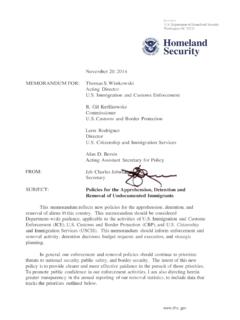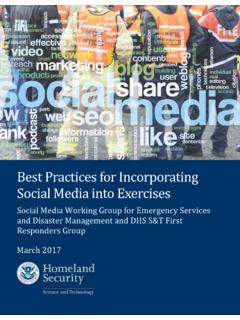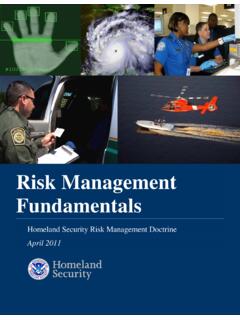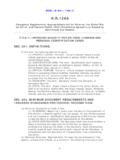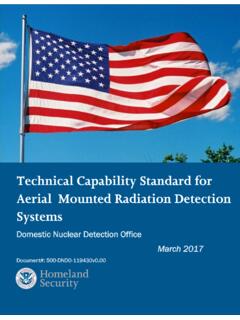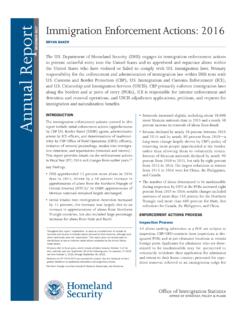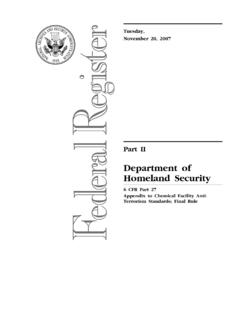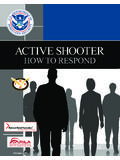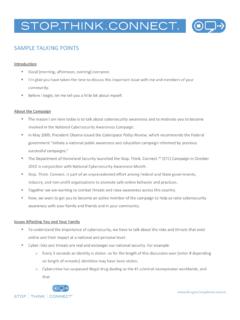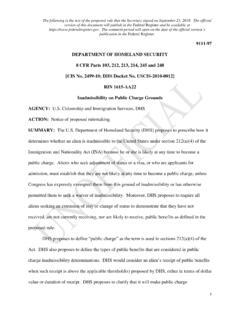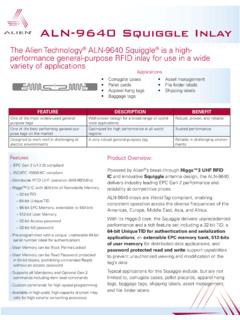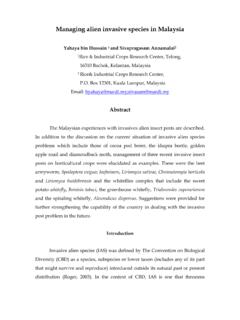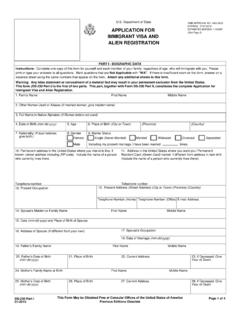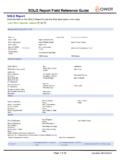Transcription of Alien Flight Student Program (AFSP) - Homeland Security
1 Privacy Impact Assessment for the Alien Flight Student Program (AFSP) DHS/TSA/PIA-026 July 28, 2014 Contact Point Steven Parsons Aviation Program Management Transportation Security Administration Reviewing Official Karen L. Neuman Chief Privacy Officer Department of Homeland Security (202) 343-1717 Privacy Impact Assessment Transportation Security Administration Alien Flight Student Program Page 1 Abstract The Transportation Security Administration (TSA) conducts Security Threat Assessments (STA) on individuals who are not citizens or nationals and other individuals designated by TSA seeking Flight instruction or recurrent training from Federal Aviation Administration (FAA)-certified Flight training providers (hereinafter referred to as covered persons for purposes of this PIA).
2 TSA previously conducted a Privacy Impact Assessment (PIA) and PIA Updates for the Alien Flight Student Program (AFSP), most recently on December 4, 2009. TSA is conducting this PIA because, since that time, several updates to AFSP have been made, including: 1) TSA performs recurrent vetting of covered individuals; 2) The Defense Attach collects biographic information and creates a record in AFSP about foreign military pilots endorsed by the Department of Defense (DoD) for Flight training in the United States; and 3) TSA has submitted an updated National Archives and Records Administration (NARA) schedule to change records retention to 80 years in order to permit TSA to comply with a requirement that it re-use fingerprints for recurrent Flight training during the life of the covered individual.
3 For purposes of this PIA only, and because all covered individuals must submit the same information to TSA, this PIA does not separately analyze each of the four categories of Flight training listed on the AFSP website: The information collected has not changed. This PIA should be read as a stand-alone document. Upon publication of this PIA, the previous PIA and PIA Updates for AFSP will be retired. Overview The mission of AFSP is to ensure that aliens and other individuals designated by TSA seeking training at Flight schools regulated by the FAA do not pose a threat to aviation or national Security . The Vision 100 Century of Aviation Reauthorization Act prohibits Flight schools regulated by the FAA from providing Flight training to covered individuals unless the Secretary of Homeland Security first determines that they do not pose a threat to aviation or national Vision 100 transferred responsibility for conducting STAs from the Department of Justice to the Department of Homeland Security (DHS).
4 TSA issued an Interim Final Rule (IFR) in 2004, which established the current requirements for covered individuals seeking Flight training in the United States or from an FAA-certified Flight training TSA implemented the AFSP in order to conduct the STAs authorized by the Aviation and Transportation Security Act (ATSA)3 and Vision 100. STAs include checks against law enforcement, immigration, and intelligence databases, as well as a fingerprint-based criminal history records check (CHRC).4 TSA will also enroll fingerprints with the Office of Biometric Identity 1 Section 612 of the Vision 100 Century of Aviation Reauthorization Act, Public Law 108-176, December 12, 2003. 2 Transportation Security Regulations, 49 CFR Part 1552.
5 3 See 49 114(f). 4 TSA conducts CHRCs pursuant to 49 CFR Part Privacy Impact Assessment Transportation Security Administration Alien Flight Student Program Page 2 Management s (OBIM) Automated Biometric Identification System (IDENT) biometric database for purposes of conducting recurrent fingerprint-based immigration and law enforcement A covered individual seeking Flight training creates an AFSP account6 and submits his or her background information and required documentation (see Section ). No STA is performed until the covered individual submits an actual training request. Once the covered individual submits a training request ( , initial Flight training or recurrent training), the AFSP performs a STA to determine whether he or she poses a threat to aviation or national Security .
6 The STA consists of recurring checks against intelligence, law enforcement, and immigration databases. If the training request is approved, TSA notifies the individual and the Flight training provider via the email address he/she provided, and the covered individual may begin training within 180 days of the approval. If the covered individual is unable to begin training within 180 days, a new training request must be submitted. If the training request is canceled or denied, both the covered individual and Flight training provider are notified by email that training is not authorized. The covered individual will have an opportunity to correct or clarify information in the application before he/she submits the application, or appeal the decision after a final determination is made.
7 Foreign military pilots who are endorsed by DoD for Flight training in the United States are not required to seek approval to train through The DoD endorsee does not undergo the standard STA process and approval to train within AFSP is not required. The DoD takes responsibility for those candidates whom the Defense Attach endorses. However, biographic information for DoD endorsees is entered into the AFSP system by the endorsing Defense Attach to create an electronic tracking record of candidates and their associated training event(s). Section Authorities and Other Requirements What specific legal authorities and/or agreements permit and define the collection of information by the project in question? The ATSA grants TSA authority to, among other things, assess threats to transportation, serve as the primary liaison for transportation Security to the intelligence and law enforcement communities, and carry out such other duties relating to transportation Security as the TSA Administrator considers appropriate.
8 Vision 100 - Century of Aviation Reauthorization Act transferred threat assessment responsibilities to TSA. TSA promulgated an IFR to implement the threat assessment Program and Security awareness training requirements on September 20, What Privacy Act System of Records Notice(s) (SORN(s)) apply to the information? 5 See the Privacy Impact Assessment for Automated Biometric Identification System (IDENT), DHS/NPPD/PIA-002 at 6 7 49 CFR Part 1552, Subpart A. 8 See 69 Fed. Reg. 56324. Privacy Impact Assessment Transportation Security Administration Alien Flight Student Program Page 3 The DHS/TSA-002 Transportation Security Threat Assessment System (T-STAS) SORN9, applies to the information collected for AFSP.
9 Has a system Security plan been completed for the information system(s) supporting the project? Yes, the Authority To Operate was granted on February 28, 2013. Does a records retention schedule approved by the National Archives and Records Administration (NARA) exist? AFSP currently operates within the schedule for the Office of Transportation Threat Assessment and Credentialing (TTAC), N1-560-06-6, approved by NARA on March 8, 2007. An updated retention schedule has been submitted to NARA seeking to retain AFSP records for 80 years after they are entered in the system in order to comply with a requirement to re-use fingerprints for recurrent training that may occur over the lifetime of a covered If the information is covered by the Paperwork Reduction Act (PRA), provide the OMB Control number and the agency number for the collection.
10 If there are multiple forms, include a list in an appendix. Flight Training for Aliens and Other Designated Individuals; Security Awareness Training for Flight School Employees, OMB Control Number 1652-0021. Section Characterization of the Information Identify the information the project collects, uses, disseminates, or maintains. TSA will collect and retain biographic and biometric data for covered individuals seeking Flight instruction or recurrent training from FAA-certified Flight training providers. TSA requires the following personally identifiable information (PII): full name (aliases and any other names previously used); date of birth; gender; country of birth; nationality; height; 9 See 75 FR 28046, May 19, 2010. 10 49 CFR Part 1552. Privacy Impact Assessment Transportation Security Administration Alien Flight Student Program Page 4 weight; biometric information; photograph; eye and hair color; country of citizenship; type of citizenship (current, dual, or historical); whether citizenship is acquired through birth or naturalization; dates of citizenship; passport information including the issue date and expiration date, status, and city of issuance; current address plus last five addresses with dates of residence, phone number(s), email address; and visa information.
